
|   |

|   |
 e-mail: ukb7@rediffmail.com New normal: Dancing behind doors August 26, 2020 Since the most trying times are beating this sub-continent down from March last, the performing arts have, among several other domains, perhaps taken the hardest knock. Deprived of its usual soirees with appreciative clientele, all the performances have disappeared from the responsive public gaze and hearing, vanishing with the consequent patronage and succor. These arts are now busy devising their own trysts with technology, to ensure “virtual” space for practice and performance, replacing their physical, audio-visual space they have been used to so long. Amidst the prevailing conditions and concerns, since each such artiste has to fall back on his or her own resources, this critic felt it was important to take a quick stock of the efforts being made and outcomes being expected, so that there is some mutual sharing of knowledge and taking note of each other's experience and corrective actions. A survey was, therefore, attempted among several major gurus who run large dance institutions in the eastern metropolis, asking them to briefly introduce their dance bodies and respond to the following four questions: 1 - How are you conducting online your teaching / learning classes and exercises? 2 - How do you propose to hold online evaluation / test of the students, after their learning process is over? 3 - How are you planning to produce online performances / hold online seminars / conduct online workshops? 4 - How will you be recruiting online fresh students and assessing their suitability? The replies received are summarized below -- alphabetically arranged under the gurus' names. Amita Dutta Mukherjee, Kathak (She is the Guru and Artistic Director of 'Ananda Chandrika,' a government recognized organization devoted to the Arts.) 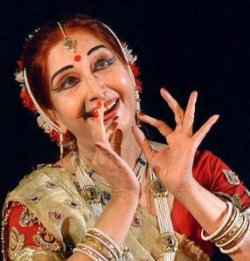 1 - I have been invited to be the course coordinator of a Performing Arts massive open online course, titled 'Foundation Course in Kathak' hosted by Ministry of Human Resource Development. This course is running now and I am teaching through videos and power-point presentations and by giving detailed academic scripts, glossaries, frequently asked questions and their answers, and summaries and synopsis of each module. There are close to 1500 enrolments and participants are from all over the world. 2 - There are weekly assignments which are evaluated. In theory there are objective assessments for 2 weeks and a subjective one every third week. The former are in the form of a quiz with multiple choice answers. The latter requires long answers which have to be corrected in detail. The students send videos of their dance for the practical examination. At the end of the course, in the month of December, there will be a proctored examination. 3 - I give online seminars through our own Ananda Chandrika Facebook portal and also for other organizations who invite me to present seminars for them. 4 - Everyone is welcome. Some complain that parts of the course are difficult for them. I always encourage them to go ahead. They will have to improve gradually. Classical dance requires sincerity, patience and dedication. There is no magic formula. I receive and answer questions sent by the participants through email and through the discussion forum that is a part of the course. Anita Mallick, Bharatanatyam (She is the director of 'Jodhpur Park Saraswat Sanskriti Kendra' founded in 1984.) 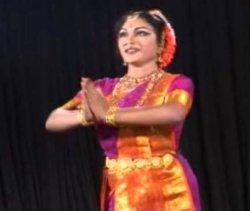 1 - Although I'm a veteran dancer and teacher by profession, I had to learn the hard way of conducting regular classes online and thankfully succeeded in it. I have discussed with the students before forming batches for live sessions. And those who couldn't join them are depending on the video lessons and perfections provided via Whatsapp. At the beginning of every live session, I am making students do breathing exercises and practice few important adavus then moving onto the item-wise training. Parallely, theories are being discussed in a question-answer format. But a single session can't be extended beyond an hour due to technical difficulties. 2 - I'm holding in-house examination, one by one, of students on every Saturday. These tests are assessing students' progress of weekly lessons taught. Students are also getting habituated in this system which actually is a result of new normal. In future also we might continue this online teaching process for people who cannot come to the institution physically. 3 - At the outset, I decide the topic of Performance/Seminar/Workshop and the required task forces. In case of performances, audience and performers are intimated about a fixed time slot and I am acting as a master of ceremony. Maximum duration of these online programs is kept around half an hour. Happily enough, audiences are responding to these ventures and sharing their feedback after watching online performances. I'm trying to arrange a seminar as well in this way. 4 - I always try to find out the rhythm sense, aesthetic sense and observation power of newly enrolled students. No formally designed Admission Test is conducted; rather I use my experience to judge their abilities. Accordingly, I keep separate classes for weaker students and to start with, correct ways of doing exercises, pranayama, etc. are taught. Teaching few of basic footwork follows thereafter. But, at the end, to learn an Indian classical art form, one needs to connect to the Guru directly. Needless to say, due to this Covid-19 situation, we all are bound to opt for alternative. Online classes are not bad but physical presence of teacher-student is always preferred for better learning. I hope to get back to our pre-Corona days and maintain the usual work process again. Nevertheless, virtual reality is a newly emerged fact and we all should adapt and use the best of it in future. Arpita Venkatesh, Odissi (She is the director of 'Malashree' group, conducting training in Odissi and Bharatanatyam. The group has been established about 22 years.) 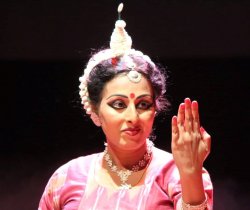 1 - I am conducting online teaching / learning classes and exercises by Zoom Live Meeting Classes & Google Meet Classes. I am also sending the videos by Whatsapp for their further reference. Most of my students are paying the requisite fees online to my bank account. I am also allowing some students whose families are under financial difficulty without paying the fees. 2 - Test is being done by Zoom or Google and also students are sending their dance videos. 3 - We have already conducted seminars on interesting subjects related to dance and art using Streamyard. I have also broadcast the seminar in Facebook live page from my group Malashree. I have planned to conduct a workshop online and interested students can make payment online. My students are paying the fees for this seminar. 4 - I have not thought about this. However, some have seen the live program of my performance and contacted me and become my students. Only social media can help in this situation, and has helped me too. Ashimbandhu Bhattacharya, Kathak (His 'Upasana Centre for Dance' explores the finest flowering and ethical exposition of Kathak dance. Upasana also works in various other activities to exchange international cultural relations.) 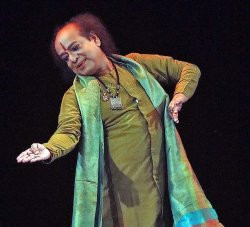 1 - Although conducting such classes are difficult especially for the traditional dance style because it is based on expression and attitude, proper body language, I am using my knowledge and experience in creating a learning environment that will be productive. I am also trying to use the electronic medium to good effect. 2 - I methodically plan my session beforehand which I implement meticulously to my students. I again meet these students after a week and in this period they keep practicing and self-reflecting on their performance. Then during my next session they ask all their questions and I clarify their doubts and then only I proceed to the next session. 3 - Regarding talk show, workshops, short presentation of my dance, for the past two months I am already conducting several talk shows, interactions, workshops and seminars through apps. Whenever there has been some network issue, I have faced problems in conducting these sessions. But without this medium, I would have failed to stay connected with so many people and therefore this slight connectivity issue can be dealt with. 4 - I always try to maintain a high standard when it comes to recruiting fresh students and I feel the virtual medium is not good enough, through which I feel I can do justice to my selection procedure. Mahua Mukherjee, Gaudiya Nritya (Mahua Mukherjee is an exponent of Gaudiya Nritya, a researcher and teacher at Rabindra Bharati University and Dean of the Faculty of Fine Arts. Mukherjee is the director of institutes 'Gaudiya Nritya Bharati' and 'Mitrayan.') 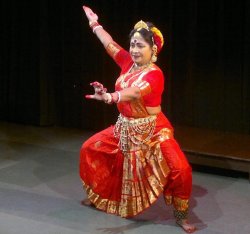 1 - Though initially I lacked the courage, being technologically challenged, later I managed to operate Zoom app and started taking online classes. At present I am taking one Practical class and one advanced Theory class for my senior students. 2 - I ask my students to make videos of the recently taught dance pieces and send me for correction and evaluation. Theoretical examination is conducted orally using Zoom or similar apps. 3 - My students and I have been delivering Webinars and online performances for different online festivals and programs. My institution Gaudiya Nritya Bharati has been organising online seminars where already more than 25 eminent speakers have enlightened us. 4 - At present I am not accepting new students who have no previous knowledge of dance, as I believe introducing a new classical form cannot be done virtually. In the initial period, personal care and guidance are very essential. Dr. Malavika Mitra, Kathak ('Shibpur Onkar Dances & Music Centre' is basically associated with training of Kathak dance for the past 25 years.) 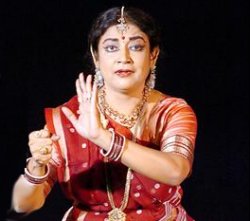 1, 2, 3, 4 - At present, I am concentrating only on training of present students and hope things will become near normal soon. I've divided my students in groups on the basis of their standard and made Whatsapp groups. I train them and assess their progress through Whatsapp video, video call, etc. Nandini Ghoshal, Odissi (She is the director of 'The Saveri Odissi Dance School', which has been imparting training in Odissi dance for the past 28 years.) 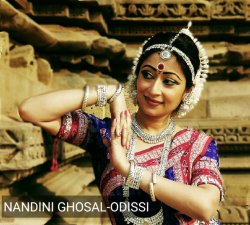 1 - For the first almost 4/5 weeks into the lockdown, only theory was taught in the classes, as Wifi / mobile data in this country is not strong enough to support uninterrupted video and synchronized audio/video which are prerequisites for online dance classes. However, with the lockdown extending week after week, a compromise had to be reached as students did the theory classes with great interest but did not practice by themselves at home. Therefore, online practical classes were started. Since such classes are never a satisfactory means of teaching dance, they were supplemented by asking students to record their dance and sending them online. These are individually corrected and sent back to them. 2 - Students are evaluated on a daily basis through corrections of their dance videos. The final evaluation of any dancer is made by the audience when she performs on stage, or maybe as of now, on online platforms. We do not believe that a dancer can be or should be evaluated through exams. Though we are attached to a Board of Examination, it is completely optional for the student to take the exams. Online examinations have not been conducted so far and we hope not to be forced to do it. 3 - Only online performances are being planned. Many of our students have already been performing on Facebook live. We do not believe in conducting workshops online. 4 - Fresh students will not be admitted online. In fact admissions have been on hold since March. Only when students can come to the class, if not in groups or individually, admissions will be possible. Piyal Bhattacharya, Marga Nritya (Committed to serve the traditional art and culture, 'Chidakashi Kalalay - Centre of Art and Divinity' is dedicated and determined to preserve, practice and propagate India's cultural heritages, explored in Natyashastra, that has been envisioned and researched into a form of practice named as 'Marga Nritya' by Piyal Bhattacharya.) 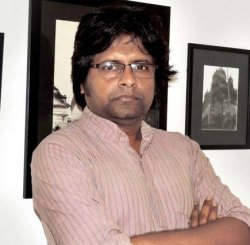 1 - During these days, live classes are difficult to take because of social distancing. But it has a positive side also; we are not very techno-friendly, but for this pandemic situation we are now becoming habituated to online classes. 2 - Firstly, we are giving power point presentations as study material. We are giving questions or home exercises and students are also responding well. 3 - I am taking lots of workshops online. For this purpose, I had to install total sound equipment to produce exact sounds of the instruments through the online app. Only a laptop is enough to reach now. 4 - Usually, I teach a few students, and my form of 'Marga Natya' is a very time consuming process of learning, so generally I take very few students. But lots of people wanted to learn this form online and I started teaching online with a few students from abroad. Maybe for the Covid-19, its positive perspective is the outcome that we are embarking on a new journey of learning! Priti Patel, Manipuri ('Anjika Centre for Manipuri Dance' in Kolkata and Imphal is engaged in imparting training in classical Manipuri dance. Anjika also has a special program of dance for the disabled, with the aim to integrate in the mainstream of society.) 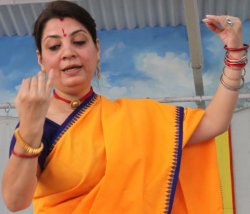 1 - Since the lockdown started in March, I immediately moved all classes online in their original timings. This way we felt "normal" except the venue was in our homes. So the same school timings were adhered to. The only addition was that I also introduced one to one sessions in order to emphasize on quality teaching. 2 - After two months, we are asking all students to make a video of their dance and send to us for evaluating. Again here, the deputed teachers and I evaluate. We are conducting multiple evaluations. 3 - Seminars are possible but workshops and performances are a challenge; they can be done but compromises have to be made. Mentally we are not prepared to compromise on the quality and standards of performance. 4 - Online students have registered. We observe them for 4 classes and then decide. And they are informed of these criteria before they register. Priyadarshini Ghosh, Mohiniattam ('Natyanova Performing Arts Centre' is a leading repertory in Mohiniattam, spearheaded by Priyadarshini Ghosh and Mohana Iyer as co-directors. Natyanova has performed at many important dance festivals and venues both in India and internationally.) 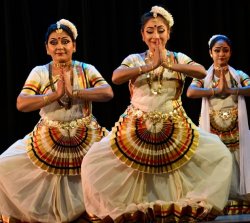 1 - Classes are being conducted online mostly with Google Meet / Google Duo or FB messenger. I first talk them through and explain the portion that I will teach them. Then I get up and show them while they sit close and watch me, after which they also get up and do the portion with me. Then I video the portion with music and share it with them. 2 - I have realized that it is the easiest if I ask them immediately to video the portion learnt and send it back to me. I then evaluate and give them feedback individually. 3 - We have produced short online performances with our repertory, where the dancers individually recorded 2 to 3 lines of the song and then it was all consolidated together to the full song through editing. We are planning on a slightly bigger production of work in the same format. Online lecture demonstrations and Webinars for the public have been an ongoing process with collaborations with other organizations. We are planning on some online workshops and seminars for the repertory to future production development of new productions. 4 - We have not been very pro-active about taking on fresh students as it is difficult to teach dance to totally new students. However, classes with students with proficiency in at least basics have been continuing, though it has been difficult to ensure perfection. The practice with senior students and repertory continues on a stronger level as they are sound with the basic vocabulary of the dance. Rajdeep Banerjee, Bharatanatyam ('Uttarpara Parampara' is a major centre for the advancement of Bharatanatyam to contemporary dance and music with the aim of revitalizing and expanding the horizons of classical dance and music in West Bengal.) 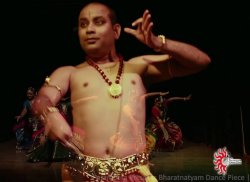 1, 2, 3, 4 - As the pandemic has pressed on, people have found innovative ways to come together, a joy that welds diversities and has the power to bring people together in one voice. There have been dances of gratitude, dances that connect, as a way of encouraging people to dance their blues away. Performing arts and music are slowly becoming a common way to bring people together and cheer them on and have been regarded as one of the best methods of improving one's self-confidence and self-esteem over time. The internet is full of free concerts, and the artists of Parampara have beamed out art from their living rooms, making the experience so much more real and personal. The dancers of Parampara have returned to their rhythm and shared their performances on the internet as a way of keeping people engaged and positive. But one quest binds every student and that is that dance frees the mind and soul. The dancers have promoted the balance and deepened the mind-body connection. The students are utilizing their time wisely by working out and practicing dance. They are composing their own videos and sending to me and I am guiding and correcting the performances accordingly. The international students have interacted with me via Messenger, Whatsapp, etc. In our institute, the students take admission once in a year during the month of January and February according to our schedule. Once the situation normalizes, the admission will be taken care of in the next year. The process of conducting online examination of the students is in progress. The students of our institute have celebrated many occasions through the digital platform by posting videos on FB page, YouTube, etc. The students have participated in the various online live concerts and kept their mind well by embracing the journey of life. Rajiv Bhattacharjee, Odissi ('Srijan Chhanda' is running for the past 25 years. Odissi steps and movements of Guru Kelucharan's gharana are incorporated to give the whole production a complete look.) 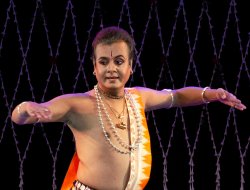 1 - We are conducting online classes for the first time. This pandemic situation has made us completely dependent on technology. Since we are not technologically savvy, we are still gathering information and getting more and more experienced with each passing day. I can successfully reach out to my students because our vibes work like magic. My students can understand my words and execute their steps properly even if I face trouble in communicating with them. Our mental connection does wonders and my students can pick up the correct steps with ease. We are taking online classes for two to three months and are gradually improving. We are still missing the ambience of our classroom and are trying to process this sadness. But I believe that we all will face this together and emerge victorious. 2 - On evaluating students, Srijan Chhanda passes an assessment on each student, but gives him/her a chance to perform based on his/her grip over the movements, postures, music and rhythm. Then the teacher decides if he/she is suitable to perform. Furthermore, the student must also have a good comprehension of music beside the dance. This still leaves a lot of room for the student to learn more about this art form. 3 - Srijan Chhanda does not have any arrangement for performing online because there must be presence of aesthetic beauty. Also, this situation has arrived all of sudden without giving us any time to make ourselves mentally ready. Srijan Chhanda is not organising anything, but students are performing solo dance pieces in various online festivals. Srijan Chhanda is not planning to do anything virtually, because we believe that the impact created on stage cannot have a true essence when performed online. 4 - We have developed our own way of dealing with the students. We follow the process of counseling in order to know more about their interest. Besides me, we have assistant teachers who come up with new interesting events for brushing up skills of the learners. Some of the ways followed by the assistant teachers are narrating mythological stories which attract kids and make them stay glued to their chairs, instilling in them a sense of rhythm in a playful manner. On one hand, there are some young souls who are fast learners. On the other hand, some are slow learners and need to pay more attention to whatever step is being taught in the class. For this type of learners, we invest more time and try our best to help them out to a great extent. We always suggest to them to read epics and other religious textbooks like Bhagavad Gita for knowing about spirituality. It is also necessary for the students to study Gita Govinda after they have reached a certain age. Sandip Mallick, Kathak ('Sonarpur Nadam', an international institute of Kathak dance, supported by Ministry of Culture, was established in 1993 by Sandip Mallick. Students from various parts of West Bengal and other states of India and also from Bangladesh, UK, USA, Canada, Dubai, Czech Republic, are learning on short-term and long-term basis.) 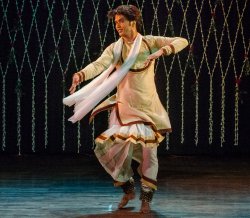 1 - Online class is not new for me. I was having one-to-one online classes since last 3 years for students abroad, but because of this lockdown now, we are having group classes for all the students (juniors to seniors/old and new/local, national and international). 2 - It is happening as normal classes -- individual correction, remedial classes. Examinations has not yet happened, planning to organize after six months. 3 - My senior students and I have done online live performances. I attended many national and international live talk shows. But from our side we organised a discussion session "Aspiration" (pre-recorded) where we discussed with 62 dancers of different age group on the topic "Establishment and sustainability of a male dancer in terms of socio economic system”. We prefer to organize some performances through recorded videos to avoid internet issues. I am conducting only the workshops live online (already done for Sikkim and New York students). 4 - Through these online classes many of my old students are being connected from outstation. Many adult new students joined, and are enjoying their classes. I plan to continue these online classes in future. We are going to start our new beginner batch from Sept, which was supposed to start last April as normal (physically present) class. Sharmila Biswas, Odissi (She is the founder and Artistic Director of 'Odissi Vision and Movement Centre' (OVM) since 1995. OVM also has a repertory.) 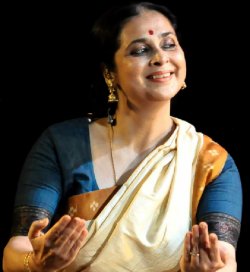 1 - Curriculum changes, more introspective. But extremely productive, and making all go deep into dance. 2 - I do not ever test/evaluate dancers. They produce homework, I correct. They evaluate themselves. 3 - NO. Lec-dems, seminars, and a few workshops are possible. It does widen the circle and the whole world can participate. 4 - Till 16 years, it is only the age. For older ones, looking at their demo videos and knowing their past experience are adequate to put them in the right classes. Sudarshan Chakravorty, Contemporary Dance ('Sapphire Creations' has been successfully performing with a new idiom for the last 28 years across the world. Sapphire's work approaches issues of gender, art, relationships, society, polity, consumerism and HIV through a global perspective, South Asian sensitivity and an experimental body stylistic.) 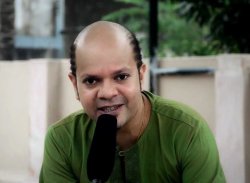 1 - Sapphire Creations have started its online classes from 15th April. Meanwhile, we have engaged our Repertory dancers in various tasks and collaborations, being at home to motivate them to create works. Initially dancers were given tasks through Whatsapp but now we are doing regular classes and rehearsals using Zoom. 2 - We already have a day-to-day process of evaluation for our interns under different parameters like attendance, punctuality, fitness, engagement in outreach etc which we are following with little changes but evaluation is an ongoing process in Sapphire as students showcase and present their skills, knowledge, technical knowhow and understanding of a given piece when they perform in front of director or the teacher concerned. 3 - Sapphire is a team of Covid art warriors. We have broken many barriers and have seen many odds before but nothing like the pandemic. But our usual habit to counter resistance has enhanced our resilience and we responded not only by online classes and seminars etc but have opened up doors of learning for those who couldn't access physical classes in Sapphire. We have involved students from USA and Canada and also have integrated our past international collaborators to continue our work. We produced many initiatives, but the main being the 'Dance Vivid', the monthly dance series live streamed to a ticketed audience where the dancers create and present new works every month. This started from 9th August celebrating our 28th anniversary. 4 - We have opened up classes for national and international access. We also have increased our number of classes and rehearsals, so that students and members can access and have options of choosing time that suits them, We now have more than 20 classes every month of around 40 hours in a month so that we don't compromise on the quality and intensity of the Sapphire training. We also partnered in a digital talent hunt called 'Indian Art League' with over 500 dancers applying from all over India and abroad and have offered free internship program to the winners who already started learning through online access. Suman Sarawgi, Manipuri ('Sparsh Studio for Performing Arts' aims to preserve, promote and propagate performing arts, under its various projects that it undertakes. Sparsh has its own repertoire of 14 members.) 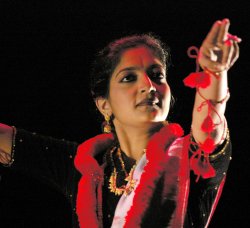 1 - Since this is the new normal we have no choice but to switch our medium of learning and teaching so we do our classes online through Zoom, Google meet, Messenger, Skype and Whatsapp. It is difficult as there is no one- to-one contact or physical presence but the learning has to go on as any art form is very therapeutic. Advantage is also there as we have a wider reach of students now from all over the world participating. 2 - For the time being, we are not going to be evaluating and have left the learning as pure joy. 3 - We are conducting online shows and seminars on Zoom, Facebook live and Instagram. 4 - We are recruiting new students but at the moment, the evaluation is self development and no assessment from our side is being done. Sutapa Talukdar, Odissi ('Gurukul' was founded by renowned Odissi guru Sutapa Talukdar in 1987. Presently, there are 2 units of Gurukul. 75 unique teachings from Guru Kelucharan Mohapatra are being documented audio-visually, supported by the Ministry of Culture. Gurukul Creative wing functions on research based practices.) 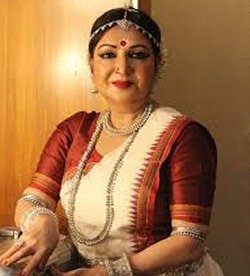 1 - For Gurukul, we usually hold regular training classes for learners from 1st to 11th year. Apart from physically training the learners, we believe, to become a 'perfect' dancer, it is of utmost importance that learners should empower themselves with knowledge and tradition of the art. To offer this, we provide necessary dancer instruction and training literature, specially created to address each group. The pandemic situation has left us, as also others, with no choice than to hold classes online. We have consciously taken the decision to continue with training of the learners, so that the budding dancers do not have to discontinue their journey. We have devised our own way of making digital classes interesting and fruitful for the learners. First, we have created separate Whatsapp group for each year, which amounts to 11 in total. Second, depending upon the year, we have sourced technical videos as well as dance videos from our archive. Also, our senior teachers have re-recorded some relevant ones. These videos are being shared in the respective Whatsapp groups, so that the learners can learn more efficiently. For each group, I hold 1 class every week over Google Meet. Each class is of one hour duration. In this, I am accompanied by my senior teachers. In case the learners have doubts or questions, they ask over these sessions. Either I or my teachers address their doubts. Once clear on their confusion, they perform the required piece and send it as video over their respective Whatsapp. With senior group as well, I am conducting detailed theory classes and furthering their training as required. 2 - Since digital is the new way, there is no other alternative than to hold evaluations online. We have planned our evaluations in 2 parts. First, for practical, learners will be provided with questions, to which they will have to prepare and send across their respective videos. Second, for theory, we will hold assessment tests in a real time online question-answer format. 3 - It is my belief that online performances do not do justice to the beauty that dance offers. Dance is liberating, both for the dancer as well as the audience. When a dancer performs before an audience, he or she feels a connection with the audience which is powerful and inexplicable. Imagine seeing a magic unfolding in front of your eyes. The very magnetism of it is divine. With online shows, I feel that connect is not quite possible to feel. However, for organizers who are putting across their request for us to hold performances, my senior students are recording their performances at home and sharing with them. Utmost care is being taken to maintain the aesthetic standards that we strictly follow. I believe, for a medium as dance, digital presentation is a bit complex as well as unfulfilling. 4 - We usually follow the process of basic evaluation whereby the student is interviewed, and he/ she is asked to perform a small piece of their choice (this is only for students who have prior experience). We are maintaining the same, only deviation is, all this is happening online. Tanusree Shankar, Uday Shankar Style ('Tanusree Shankar Dance Academy' in Kolkata is a large dance institution that imparts training in the Uday Shankar Style of dance, following the path shown by the legendary genius, Uday Shankar.) 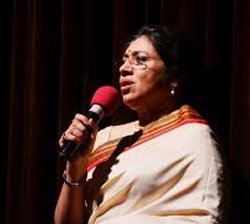 1 - We had never ever thought that we will have to conduct classes online. It had seemed impossible at a point of time. Today, we have been pushed to do the impossible. At the outset, I was very skeptical about the process, but over a period of time, we have learnt how to transfer the body language online! We all had to go through vigorous training in order to perfect our skill through the new media. Our entire school is online at present, including the yoga classes. It definitely was tough initially but now we all have got used to it. 2 - Honestly, we have not thought of the process of exams or evaluation as of now. The whole exercise of teaching dance online is comparatively slower than usual, hence shall plan later as to how we will evaluate or take exams online. 3 - We have not planned anything as yet. 4 - Our fresh batch of students has already joined from all over the country and abroad. We do not have any auditions prior to admission. Everyone can join and learn. Thankamani Kutty, Bharatanatyam ('Kalamandalam Performing Arts and Research Centre' (KPARC) was founded in 1968 by Kalamandalam Govindan Kutty and Kalamandalam Thankamani Kutty, in Kolkata. Well over 50 years, and with adequate auditorium and infrastructure, the aim of the society has been to spread Indian art and culture worldwide and assist the serious students of performing arts to develop as independent artistes.) 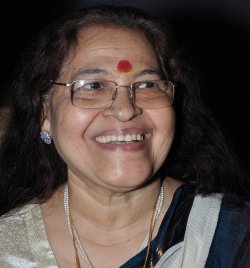 1 - Though we are facing problems with the network conditions, we are bound to continue our classes online. There are quite a few apps available on mobile which we are sharing with our students and teachers and creating a group. Hence, we can conduct our classes as the corporate do regarding their online meetings. 2 - This is something we are horrified about. Now since the classical dances that we teach involves a lot of interactions between a teacher and the students, it is virtually impossible to impart training to a group of students or rather teach something new through online. It is next to impossible to teach the children something new online if they are less than 8 years of age. Now for evaluation, we have asked all our students to send their individual dance practice sessions through Whatsapp to the teacher concerned. 3 - We are not conducting any workshops online. But we are organizing festivals online through Facebook and YouTube. Here we are actually uploading items which we had pre-recorded before the Covid period, which we are presenting with small introductions about the items by the choreographer herself which is expected to create some extra interest. 4 - Firstly, we are very hopeful that by January 2021, our school will re-open and we will be able to conduct regular classes with proper distancing and sanitization. Our admissions are usually in January every year. We do not want to admit students online if they are being introduced to the dance for the first time. Because, taking online lessons for young children are next to impossible which I had mentioned earlier. However, we would like to admit students online who have some experience in the field if they want to get admitted to our school. While the picture that emerged was a mixed bag, there did appear a strong possibility of learning from each other's sincere efforts, to come to grip with the new realities. 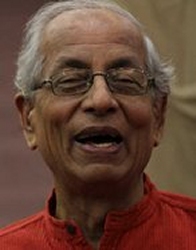 Dr. Utpal K Banerjee is a scholar-commentator on performing arts over last four decades. He has authored 23 books on Indian art and culture, and 10 on Tagore studies. He served IGNCA as National Project Director, was a Tagore Research Scholar and is recipient of Padma Shri. Post your comments Please provide your name and email id when you use the Anonymous profile in the blog to post a comment. All appropriate comments posted with name and email id in the blog will also be featured in the site. |